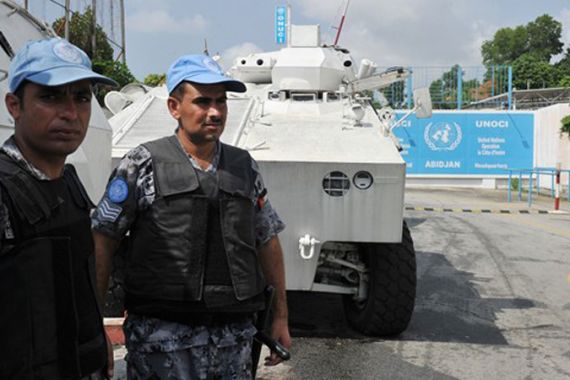UN backs Cote d’Ivoire’s Ouattara
General Assembly formally recognises Alassane Ouattara as president as West African bank blocks funds to Laurent Gbagbo.

| Al Jazeera’s Ama Boateng reports from Abidjan on the post-election violence that has killed scores |
The United Nations General Assembly has formally recognised Alassane Ouattara as the winner of Cote d’Ivoire’s presidential election.
The 192-nation body unanimously voted on Thursday for a resolution recognising Ouattara’s selection of ambassador to the UN, Youssouf Bamba, as the sole representative for Cote d’Ivoire.
World leaders and the UN mission in Cote d’Ivoire had already named Ouattara as the winner of the November 28 runoff poll.
But Thursday’s move served to boost his bid to unseat incumbent Laurent Gbagbo, who has also claimed victory in the poll and has refused to step down. Gbagbo remains in control of major state institutions.
Meanwhile, West Africa’s central bank cut funds to Gbagbo, further adding to pressure on the incumbent.
Deaths and arrests
“The council of ministers has taken note of the decisions of the UN, the African Union, and of (West African regional body) ECOWAS, to recognise Alassane Ouattara as the legitimate elected president of Ivory Coast,” a statement from the Central Bank of the West African Economic and Monetary Union said.
The statement, issued on Thursday after a meeting of ministers in Guinea Bissau, said only appointed members of the “legitimate government” would be permitted to access funds in the central bank’s accounts.
Cote d’Ivoire’s disputed presidential election has sparked days of violence, prompting fears of a return to civil war.
The UN announced earlier on Thursday that at least 173 people have been killed and 114 others have gone missing or been tortured in post-election violence.
At least 471 arrests and detentions have also been recorded between December 16 and 21, according to UN deputy human rights commissioner Kyung-wha Kang, who was speaking to diplomats at a special session on Cote d’Ivoire in Geneva.
She said the Ivorian government’s restrictions on UN personnel were making it “impossible” to investigate all the allegations of human rights abuses, including reports of mass graves.
Kang said that the UN special representative of the secretary-general had been “stopped at gunpoint as he sought to verify such allegations”.
David Kennedy, spokesman for the US mission to the UN in Geneva, said that the US is “deeply concerned by the extent of the abuses being perpetrated” in Cote d’Ivoire.
Al Jazeera’s Ama Boateng, reporting from Abidjan, says that the situation is difficult for the UN, as under its current mandate, “it cannot physically get involved or intervene”, as Ouattara’s supporters want it to do.
She said that on the other hand, any time that the UN issues statements in favour of Ouattara, this gives the Gbagbo government “pretext” to accuse it of not being impartial.
“While words continue, Laurent Gbagbo is still effectively the man in charge.”
Military reaffirms support
A day earlier, a Gbagbo spokesman said that the Ivorian military stands united behind him, after a political ally of Ouattara said foreign leaders may resort to force to oust him.
 |
| Ouattara was declared winner of the November 28 presidential runoff by the UN mission in Abidjan [AFP] |
The military’s support for Gbagbo is seen as one of the reasons he is able to defy calls to step down.
The comment came hours after Guillaume Soro, the prime minister of Ouattara’s rival government, said the “only solution” to the crisis was for world leaders to use force to oust him if other measures fail.
The US, the UN, the European Union, the African Union and ECOWAS had all recognised electoral commission results showing Ouattara as the winner of the election and have called on Gbagbo to step down.
The US and the European Union have also since placed travel sanctions on Gbagbo and his inner circle, and the World Bank on Wednesday froze funding to the country, to which it has aid commitments of over $800 million.
Gbagbo has shown no sign of caving to the pressure and insists he won the election, after the Constitutional Court headed by one of his allies threw out hundreds of thousands of votes from pro-Ouattara constituencies.
The standoff turned violent last week after gun battles broke out briefly between government soldiers and the rebels who now back Ouattara, and residents of pro-Ouattara neighbourhoods have said masked gunmen have broken into homes by night and kidnapped people.